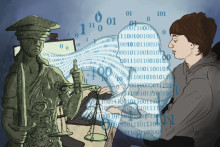The Iranian Mechanical Engineering student used ChatGPT for an essay in 2023 and was caught doing so. He then ended up in a complex and protracted case with the Board of Examiners. U-Today wrote a reconstruction about how it could get so out of hand – based on dozens of sources – last March.
Legal Fees
Initially, Tochahi was vindicated in a ruling by the CBE. It upheld the student's appeal and lashed out at the Board of Examiners. According to the CBE, the committee had 'fully adopted' the plagiarism results of the software, while it should have investigated the original sources. The Board of Examiners also had to reimburse Tochahi's legal costs of 1194 euros.
But that wasn't the end of it. The Board of Examiners issued a new ruling, against which the student appealed. A mediation meeting between the student and the Board of Examiners just before the Christmas holidays also did not lead to a solution. On 29 February, the CBE ruled that the Board of Examiners was in the right and declared the student's appeal unfounded.
However, Tochahi spoke of a 'double conviction' and found the decision of the examination committee 'disproportionate'. He filed a notice of appeal with the Council of State – formerly the Higher Education Appeals Tribunal.
The action is unfounded
At the end of April 2024, the case was heard in The Hague. The verdict was initially supposed to follow six weeks later, but it was postponed until Wednesday morning, July 17. In the ruling, the Council of State indicates that there is no question of double punishment 'now that the decision of 24 November 2023 has replaced the annulled decision of 17 July 2023.' Also, according to the Council of State, the Board of Examiners remained 'within the sanctioning powers', there was no question of double punishment and the Board of Examiners showed leniency by allowing the student to start his bachelor's assignment earlier. As a result, Tochahi's ground of appeal fails, is unfounded and the CBE does not have to reimburse his legal costs.
The ruling is in line with the judgment that the CBE already issued on 29 February. That the fraud found was 'undisputed'. The CBE also stated that 'the sanction imposed has remained within the boundaries of the existing sanctions ladder'. The CBE also found that the consequences for the student were ultimately limited, because he was allowed to resit the assignment and complete other courses at an early stage.








